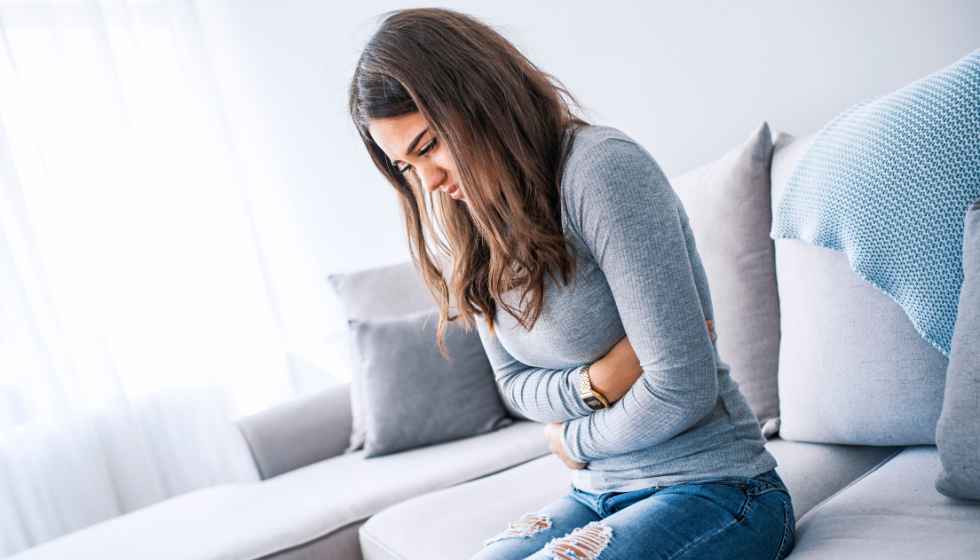Often benign, stomach aches are nonetheless very unpleasant. Moreover, they can indicate an underlying health problem or a more serious pathology. Stomach pain can be felt as cramping, burning, or dull pain. It can be mild or intense, lasting a few minutes or several hours.
Our doctors explain the causes, symptoms, treatments, and preventive measures of stomach ailments.
What is stomach pain?
Stomach pain is a common symptom but can be indicative of many more or less serious health problems. It can be temporary or chronic, mild or severe, accompanied by other symptoms such as nausea, vomiting, bloating, or changes in bowel habits. Stomach aches can just as well be due to an excessive or unbalanced diet, chronic pathologies such as Crohn’s disease or irritable bowel syndrome, and serious digestive diseases, such as stomach cancer, or even be an indirect sign of cardiovascular pathologies such as myocardial infarction.
What are the main causes of stomach pain?
Many causes can explain stomach pain. Our doctors tell you more about the most common ones.
Gastroesophageal reflux disease (GERD)
GERD occurs when acids produced by the stomach during digestion back up into the esophagus. It can cause pain and heartburn, nausea, and vomiting. These pains are generally aggravated after ingesting fatty foods, which stimulate the secretion of acids.
Gastric ulcer
A gastric ulcer, also called a stomach ulcer, is a lesion in the lining that can cause stomach pain, nausea, vomiting, and loss of appetite. These pains are generally relieved by food and intensify during digestion.
Inflammation of the stomach
Gastritis is an inflammation of the stomach lining that can cause stomach pain, nausea, vomiting, and bloating.
Irritable Bowel Syndrome (IBS)
Irritable Bowel Syndrome ( IBS) is a chronic condition that affects the colon. Symptoms include abdominal pain, bloating, and bowel disturbances, such as bouts of diarrhea alternating with periods of constipation.
Helicobacter pylori infection
Helicobacter pylori is a bacterium that can infect the stomach and cause gastric ulcers, gastritis, and even stomach cancer. It can also be present in the stool. Generally, this bacterium has been present in the body from childhood, and it may not cause any symptoms. It can also be contaminated during trips to countries where hygiene is less controlled than in France. Its treatment is easy, but its consequences can be serious, hence the importance of talking about your stomach pain to your doctor to detect this bacteria as soon as possible.
Stomach cancer
Stomach cancer is a type of cancer that develops in the stomach wall. Symptoms include stomach pain, loss of appetite, weight loss, and vomiting.
How to prevent stomach pain?
Although sometimes sudden and difficult to anticipate, stomach upsets can be prevented. Here is the advice of our doctors.
Avoid spicy and fatty foods.
Spicy and fatty foods can irritate the stomach lining and cause pain. Limit their consumption to protect yourself against bloating and other transit disorders.
Avoid alcohol and tobacco.
Alcohol and tobacco can irritate the stomach lining and cause pain. If you wish to reduce your alcohol consumption or try to quit smoking, do not hesitate to consult your doctor or one of our doctors on Livi if the latter is unavailable.
Eat slowly and steadily.
Chewing food well and eating slowly and regularly without snacking or skipping meals promotes digestion. It thus helps reduce the risk of stomach pain and bloating.
Better manage your stress.
As we know, mental health can greatly impact physical health. This is called somatization. Thus, stress and anxiety can cause stomach pain. Certain breathing or meditation techniques can help you deal better with stressful situations.
What is the treatment for stomach pain?
Possible treatments for stomach pain depend on what is causing it.
A better lifestyle
Lifestyle changes such as eating better, reducing alcohol and tobacco consumption, and managing stress are simple but very effective solutions to help ease stomach pain.
Drug treatment
Medicines may be prescribed to treat stomach pain caused by GERD, gastric ulcer, or Helicobacter pylori infection, such as:
- Antacids in different forms: gels, tablets to chew or swallow;
- Proton pump inhibitors (which reduce acidic gastric secretions);
- Certain antibiotics in case of Helicobacter Pylori infection.


